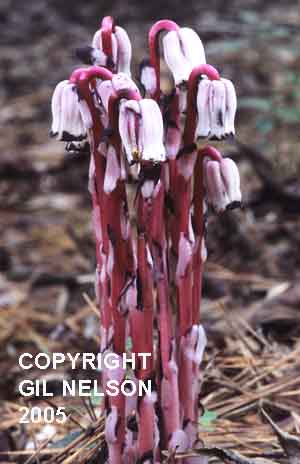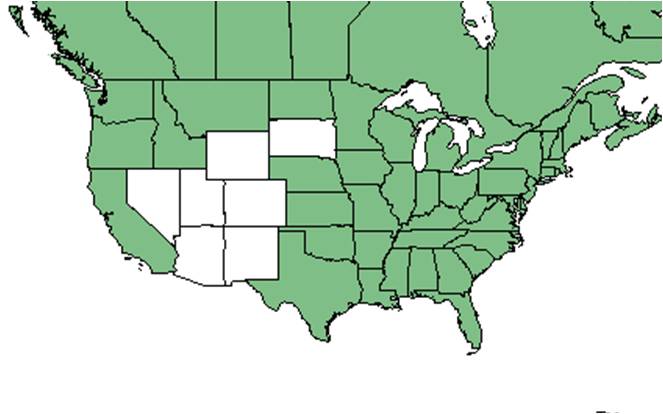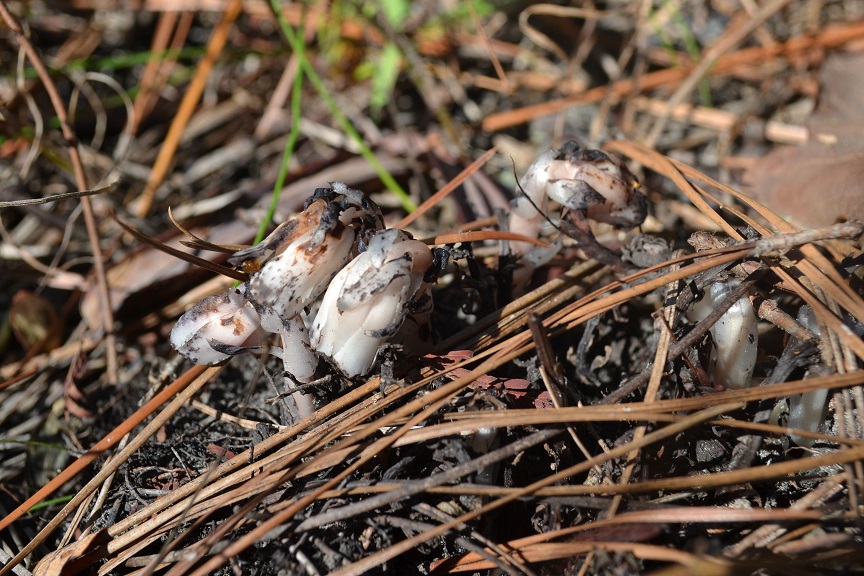Difference between revisions of "Monotropa uniflora"
(→Conservation and Management) |
Krobertson (talk | contribs) |
||
| Line 30: | Line 30: | ||
===Habitat=== <!--Natural communities, human disturbed habitats, topography, hydrology, soils, light, fire regime requirements for removal of competition, etc.--> | ===Habitat=== <!--Natural communities, human disturbed habitats, topography, hydrology, soils, light, fire regime requirements for removal of competition, etc.--> | ||
| − | This species can be found in mixed woodlands, mesic bluffs, ravine edges, along swamps, pine scrub, and hardwood hammock edges | + | This species can be found in mixed woodlands, mesic bluffs, ravine edges, along swamps, pine scrub, and hardwood hammock edges. <ref name="FSU Herbarium">Florida State University Robert K. Godfrey Herbarium database. URL: [http://herbarium.bio.fsu.edu http://herbarium.bio.fsu.edu]. Last accessed: June 2014. Collectors: Loran C. Anderson, Herbert Kessler, Jacob Kimel, R.K. Godfrey, John B. Nelson, George R. Cooley, D. B. Ward, J. Beckner, Lovett E. Williams, Michael Castagna, Travis MacClendon, K. MacClendon, P. Howell, B. Thomas, G. Wilder, R. Komarek, Kathleen Brady, Ed Keppner, and Lisa Keppner. States and Counties: Florida: Bay, Calhoun, Gadsden, Hernando, Leon, Liberty, Marion, and Wakulla. Georgia: Grady.</ref> Observed growing in shaded areas, ''M. uniflora'' occurs in moist and dry sand, sandy loam, and rich hummus. <ref name="FSU Herbarium"/> It is also found in human discturbed habitats such as hiking trails, residential backyards, and front lawns. <ref name="FSU Herbarium"/> Associates species include ''Carya, Magnolia, Quercus, Habernaria quinqueseta, Cypress, Burmannia biflora, Pinus clausa, Quercus myrtifolia,'' and ''Q. maritima''. <ref name="FSU Herbarium"/> |
===Phenology=== <!--Timing off flowering, fruiting, seed dispersal, and environmental triggers. Cite PanFlora website if appropriate: http://www.gilnelson.com/PanFlora/ --> | ===Phenology=== <!--Timing off flowering, fruiting, seed dispersal, and environmental triggers. Cite PanFlora website if appropriate: http://www.gilnelson.com/PanFlora/ --> | ||
| − | This species has been observed flowering and fruiting in February, March, and October through December | + | This species has been observed flowering and fruiting in February, March, and October through December. <ref name="FSU Herbarium"/> |
===Seed dispersal=== | ===Seed dispersal=== | ||
According to Kay Kirkman, a plant ecologist, this species disperses by gravity. <ref name="KK"> Kay Kirkman, unpublished data, 2015. </ref> | According to Kay Kirkman, a plant ecologist, this species disperses by gravity. <ref name="KK"> Kay Kirkman, unpublished data, 2015. </ref> | ||
| Line 54: | Line 54: | ||
==References and notes== | ==References and notes== | ||
| − | |||
Revision as of 10:57, 3 August 2016
| Monotropa uniflora | |
|---|---|

| |
| Photo was taken by Gil Nelson | |
| Scientific classification | |
| Kingdom: | Plantae |
| Division: | Magnoliophyta - Flowering plants |
| Class: | Magnoliopsida – Dicotyledons |
| Order: | Ericales |
| Family: | Monotropaceae |
| Genus: | Monotropa |
| Species: | M. uniflora |
| Binomial name | |
| Monotropa uniflora L. | |

| |
| Natural range of Monotropa uniflora from USDA NRCS Plants Database. | |
Common name: Indianpipe
Contents
Taxonomic notes
Synonym: Monotropa brittonii Small
Description
A description of Monotropa uniflora is provided in The Flora of North America.
Distribution
Ecology
Habitat
This species can be found in mixed woodlands, mesic bluffs, ravine edges, along swamps, pine scrub, and hardwood hammock edges. [1] Observed growing in shaded areas, M. uniflora occurs in moist and dry sand, sandy loam, and rich hummus. [1] It is also found in human discturbed habitats such as hiking trails, residential backyards, and front lawns. [1] Associates species include Carya, Magnolia, Quercus, Habernaria quinqueseta, Cypress, Burmannia biflora, Pinus clausa, Quercus myrtifolia, and Q. maritima. [1]
Phenology
This species has been observed flowering and fruiting in February, March, and October through December. [1]
Seed dispersal
According to Kay Kirkman, a plant ecologist, this species disperses by gravity. [2]
Conservation and management
Cultivation and restoration
Photo Gallery
References and notes
- ↑ 1.0 1.1 1.2 1.3 1.4 Florida State University Robert K. Godfrey Herbarium database. URL: http://herbarium.bio.fsu.edu. Last accessed: June 2014. Collectors: Loran C. Anderson, Herbert Kessler, Jacob Kimel, R.K. Godfrey, John B. Nelson, George R. Cooley, D. B. Ward, J. Beckner, Lovett E. Williams, Michael Castagna, Travis MacClendon, K. MacClendon, P. Howell, B. Thomas, G. Wilder, R. Komarek, Kathleen Brady, Ed Keppner, and Lisa Keppner. States and Counties: Florida: Bay, Calhoun, Gadsden, Hernando, Leon, Liberty, Marion, and Wakulla. Georgia: Grady.
- ↑ Kay Kirkman, unpublished data, 2015.
